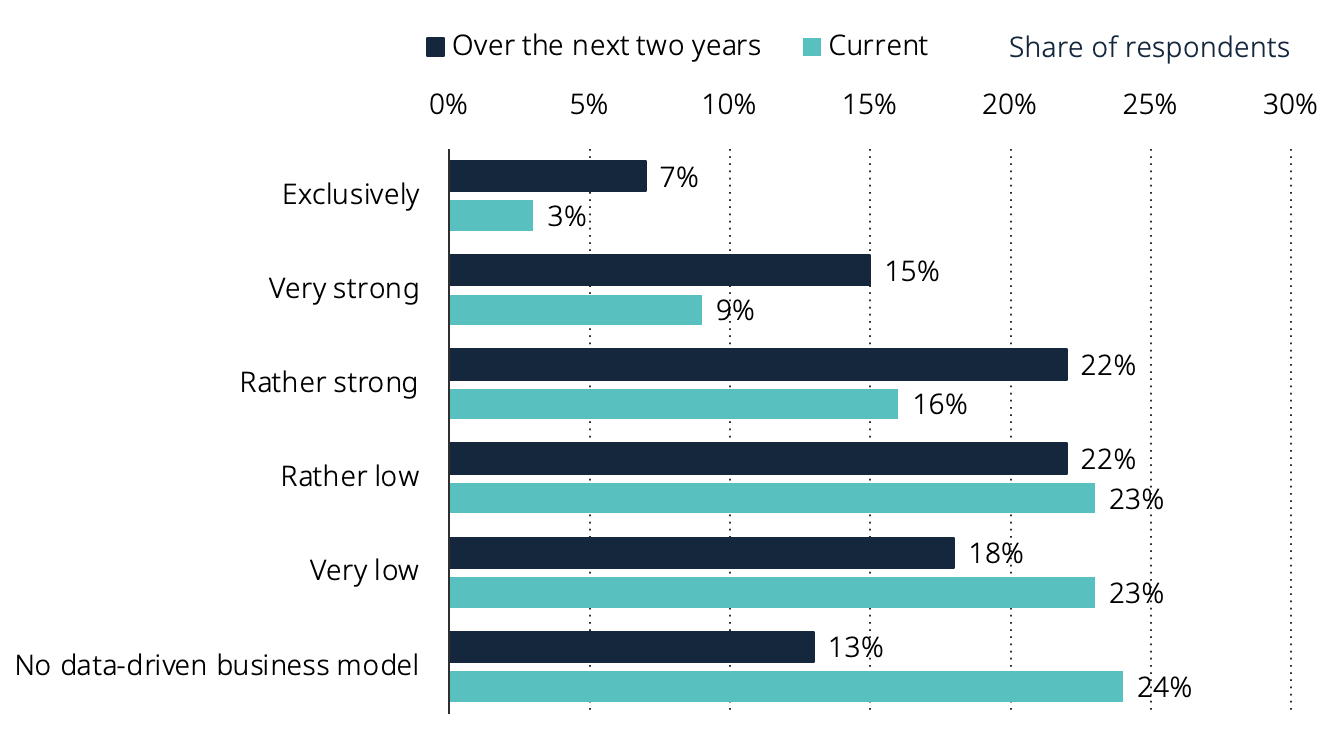Top Story: Gold-plating data – the data economy!
In our digitalized world, data is the new gold. It is a potential source of knowledge, efficiency optimization and new revenue. Companies that learn to monetize their data effectively can gain a decisive competitive advantage.
There are two types of data monetization. Direct data monetization involves the sale of data assets directly to third parties or customers for financial gain. Indirect data monetization, on the other hand, involves using the data internally to optimize operations, improve products or services and enrich the customer experience.
In 2023, the bitkom association published the study “Data economy – where does the German economy stand“. The conclusion: almost half of companies expect data-driven business models to make a significant contribution to their business success in two years’ time.
How much do data-driven business models contribute to business success?
Survey on the importance of data-driven business models in Germany in 2023

Source: bitkom, May 15, 2023, atares representation
.
What strategies exist for successful data monetization?
- Development of data-driven products and services: Companies can develop new products or services based on their data.
- Implementation of data partnerships and collaborations: Companies can enter into partnerships with other companies to share and monetize their data.
- Monetization of data through targeted advertising: Companies can use their data to place targeted advertising and thus generate additional revenue.
- Exploring subscription-based data models: Companies can offer subscription models for their data to generate regular revenue.
- Creating data marketplaces for additional revenue: Companies can sell their data on data marketplaces to generate additional revenue.
- Direct monetization: A simple example of direct data monetization is contact lists of potential business customers that influence buyers’ business or commerce.
We see the following examples in the various sectors:
- FinTech: Companies use transaction data to develop personalized financial products and improve risk management models.
- HealthTech: In healthcare technology, data is used to improve treatment methods and personalize medicine. The analysis of patient data enables more precise diagnoses and the individualization of treatment plans.
- Supply chain tech: data integration in the supply chain enables more efficient logistics and warehousing. Sensor data helps to monitor product statuses and optimize delivery routes.
- HR tech: In HR, data analysis is revolutionizing recruiting and employee management. Algorithms can, for example, use applicant data to predict the accuracy of fit for a position.
- Industrial Tech: In industry, the analysis of operating data makes it possible to predict maintenance requirements and production costs, increase the efficiency of production lines and calculate the carbon footprint of new products.
- PropTech: Real estate companies use market and usage data to make investment decisions and optimize building operations.
- Mobility: Mobility data helps to analyze traffic flows and develop efficient, sustainable transport solutions.
The future of the data economy promises an even closer integration of AI technologies that enable automated and intelligent decision-making processes in real time. Advancing digitalization and the growth of the IoT are increasing the flood of data and thus the range of possibilities for data analysis. However, it will be crucial to develop regulations and standards that not only maximize economic benefits, but also protect the privacy and security of individuals.
We are on the threshold of a new era of the digital economy, in which data is the key to sustainable growth and innovation. From investing in innovative start-ups and cooperating with them to setting up our own “Data Gold Units”: let’s seize these opportunities together and tackle the challenge with courage!
Further reading:
Research areas of data economics – Wirtschaftsdienst
Federal Network Agency – Data economy
About atares
atares is the digital M&A boutique for technology-driven midcap companies in Germany and sees itself as a pioneer for the digitalization of the M&A industry. Founded in 2001, atares has advised more than 200 transactions in more than 20 years. The focus is on transaction volumes between EUR 10 and 100 million of mostly owner-managed companies. Since November 2023, the company formerly known as Proventis Partners, Munich, has been operating under the new company name atares GmbH. Atares has long-standing personal contacts with corporate and Private Equity investors and M&A advisors in Europe, North and South America and Asia. Highly specialized expertise for the market, empathy for people and passion make atares a sought-after M&A partner for the tech champions of tomorrow. More than 20 employees at atares in Munich and Düsseldorf manage their projects via the in-house developed digital M&A dealfloor (dealfloor.co) – for value-adding, efficient transactions with the best user experience.
Press Contact
Franziska Wolfgram
f.wolfgram@atares.team
+4989 – 38888-124